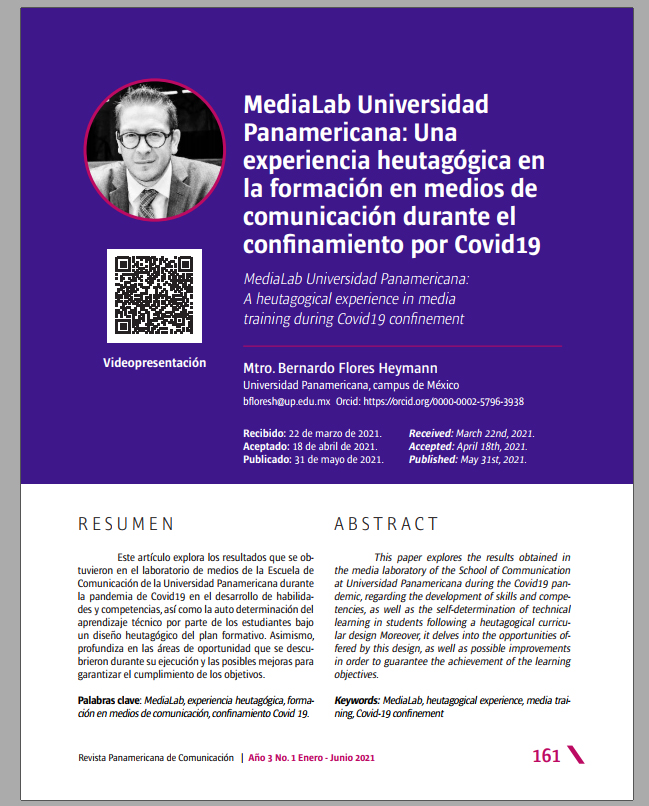MediaLab Universidad Panamericana: A heutagogical experience in media training during Covid19 confinement
Main Article Content
Abstract
This paper explores the results obtained in the media laboratory of the School of Communication at Universidad Panamericana during the Covid19 pandemic, regarding the development of skills and competencies, as well as the self-determination of technical learning in students following a heutagogical curricular design Moreover, it delves into the opportunities offered by this design, as well as possible improvements in order to guarantee the achievement of the learning objectives.
Article Details
Keywords:
References
Arum, R., & Roksa, J. (2011). Academically adrift: Limited learning on college campuses. Chicago/London: University of Chicago Press.
Bentley University (2014). The Prepared U Project: An in-depth look at millennial preparedness for today’s workforce. [White Paper]. Retrieved from: https://www.bentley.edu/files/prepared/1.29.2013_BentleyU_Whitepaper_Shareable.pdf
Blaschke, L. M., & Hase, S. (2016). Heutagogy: A holistic framework for creating twenty-first-century self-determined-learners. In The Future of Ubiquitous Learning (pp. 25–40).
Blaschke, L. M. (2012). Heutagogy and lifelong learning: A review of heutagogical practice and self-determined learning. The International Review of Research in Open and Distributed Learning, 13(1), 56-71. https://doi.org/10.19173/irrodl.v13i1.1076
Dick, B. (2013). Crafting learner-centered processes using action research and action learning. In Hase & Kenyon (eds), Self-determined learning: Heutagogy in action. Bloomsbury Academic, London, UK.
Evans, M. (2015, Sept). Creative Media Issues [Presentación en vivo en la reunion global de SAE Institute]. The Gap of Creative Media Education and Employers, Berlin, Alemania.
Garabello, M. (2019, Nov). Digital Media Latam [Presentación en vivo en la reunión latinoamericana de WAN-IFRA]. UOL Editorial Brands, Rio de Janeiro, Brasil.
Gerstein, J. (2014). Moving from education 1.0 through education 2.0 towards education 3.0. En L. M Blaschke, C. Kenyon & S. Hase, S. (eds.) Experiences in self-determined learning, Amazon Publishing, 83-98.
Glassner, A., & Back, S. (2019). Heutagogy (Self-determined Learning): New Approach to Student Learning in Teacher Education. Journal Plus Education, 24, 40-44.
Kamenetz, A. (2010). Edupunks, edupreneurs, and the coming transformation of higher education. Canada: Chelsea Green Publishing Company.
Hase, S. (2016). Self-determined Learning (heutagogy): Where Have We Come Since 2000?. Southern Institute of Technology Journal of Applied Research. Special Edition.
Stoten, D. W. (2020). Practical Heutagogy: Promoting Personalized Learning in Management Education. Adult Learning, 31(4), 161-174. https://doi.org/10.1177/1045159520905364
The World Bank. (2003). Lifelong learning in the global knowledge economy: Challeng- es for developing countries. Washington, D.C.: The World Bank. Retrieved from http://siteresources.worldbank.org/INTLL/Resources/Lifelong-Learning-in-the- Global-Knowledge-Economy/lifelonglearning_GKE.pdf
Bentley University (2014). The Prepared U Project: An in-depth look at millennial preparedness for today’s workforce. [White Paper]. Retrieved from: https://www.bentley.edu/files/prepared/1.29.2013_BentleyU_Whitepaper_Shareable.pdf
Blaschke, L. M., & Hase, S. (2016). Heutagogy: A holistic framework for creating twenty-first-century self-determined-learners. In The Future of Ubiquitous Learning (pp. 25–40).
Blaschke, L. M. (2012). Heutagogy and lifelong learning: A review of heutagogical practice and self-determined learning. The International Review of Research in Open and Distributed Learning, 13(1), 56-71. https://doi.org/10.19173/irrodl.v13i1.1076
Dick, B. (2013). Crafting learner-centered processes using action research and action learning. In Hase & Kenyon (eds), Self-determined learning: Heutagogy in action. Bloomsbury Academic, London, UK.
Evans, M. (2015, Sept). Creative Media Issues [Presentación en vivo en la reunion global de SAE Institute]. The Gap of Creative Media Education and Employers, Berlin, Alemania.
Garabello, M. (2019, Nov). Digital Media Latam [Presentación en vivo en la reunión latinoamericana de WAN-IFRA]. UOL Editorial Brands, Rio de Janeiro, Brasil.
Gerstein, J. (2014). Moving from education 1.0 through education 2.0 towards education 3.0. En L. M Blaschke, C. Kenyon & S. Hase, S. (eds.) Experiences in self-determined learning, Amazon Publishing, 83-98.
Glassner, A., & Back, S. (2019). Heutagogy (Self-determined Learning): New Approach to Student Learning in Teacher Education. Journal Plus Education, 24, 40-44.
Kamenetz, A. (2010). Edupunks, edupreneurs, and the coming transformation of higher education. Canada: Chelsea Green Publishing Company.
Hase, S. (2016). Self-determined Learning (heutagogy): Where Have We Come Since 2000?. Southern Institute of Technology Journal of Applied Research. Special Edition.
Stoten, D. W. (2020). Practical Heutagogy: Promoting Personalized Learning in Management Education. Adult Learning, 31(4), 161-174. https://doi.org/10.1177/1045159520905364
The World Bank. (2003). Lifelong learning in the global knowledge economy: Challeng- es for developing countries. Washington, D.C.: The World Bank. Retrieved from http://siteresources.worldbank.org/INTLL/Resources/Lifelong-Learning-in-the- Global-Knowledge-Economy/lifelonglearning_GKE.pdf


